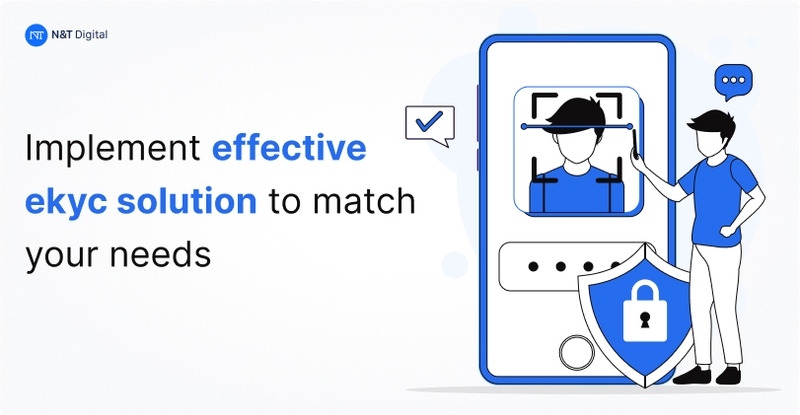In simpler terms, KYC (Know Your Customer) is a digital handshake of business. With online transactions and faceless interactions, companies must ensure that you are the real person you claim to be.

That's where eKYC comes in.
Forget those long forms and trips to the bank with a stack of paperwork. eKYC (electronic Know Your Customer) is about streamlining identity verification. It's faster, smoother, and way more convenient for everyone involved. Just as you’d scan a QR code for payments, eKYC payments require scanning identity documents and complying with KYC needs.
Here's a key stat that shows how big this shift is: the eKYC market was $447.53 million in 2021 and is expected to hit $1,964.73 million in 2029.
So, are you ready to ditch the old-school KYC headaches and embrace the future with an eKYC solution?
Understanding eKYC
Think of eKYC as a digital identity check-up for your customers that is made up of a few key pieces like
- ID Verification : Checking official documents (driver's license, passport) to ensure the name and info match up.
- Facial Recognition : Taking a selfie! The tech compares it to the photo on the ID to confirm it's the same person.
- Facial Recognition : Software scans the ID for signs of tampering or forgery, keeping fraudsters out.
- Liveness Checks : These can be anything from blinking on command to reading a short phrase to prove the person is real.
The Power of eKYC: Onboarding and Beyond
When it comes to the software development process, specifically for eKYC, you need not just consider ticking compliance boxes. It's a game-changer for getting new customers on board smoothly, where they do not need to wait days for paperwork.
Also, eKYC authentication can minimise compliance risks by ensuring fewer legal complications and a stronger business reputation.
Types of eKYC
For eKYC authentication has two main types
- Manual KYC Verifications : An old-school way where a human reviews documents and checks them against customer data.
- KYC Automation : A digital eKYC software solution takes over much of the verification process. This eKYC authentication applies algorithms to analyse documents, compare data, and perform liveness checks.
- Quick Comparison : Manual KYC vs. KYC Automation
| Feature | Manual KYC | KYC Automation |
|---|---|---|
| Speed | Slow | Fast |
| Accuracy | Prone to errors | Highly accurate |
| Cost | Higher due to workforce | More cost-effective in the long run |
| Scalability | Difficult to scale | Handles large volumes with ease |
| Customer Experience | Cumbersome and frustrating | Smooth and streamlined |
| Process | Manual, in-person | Digital, remote |
| Customer Experience | Cumbersome | Smooth and convenient |
How Does the eKYC Platform Work?
The eKYC platform will combine secure technology with smart processes to confirm that your customers are who they say they are. At its core, this requires eKYC platforms to leverage FinTech software & app development services that help develop a streamlined approach for identity verification without any physical documents. It replaces the need for in-person visits and piles of paperwork by using top eKYC solutions.
Let's break down the eKYC flow and how it gets the job done.
User Initiation
The customer begins by providing basic information (like name and address) through a web portal or mobile app as part of the eKYC process.
Why is it needed?To set the stage for verification for the eKYC functionality to start the process.
Document Submission
The customer uploads a scan or photo of their government-issued ID and other required documents.
Why is it needed?Provides the foundation for checking the customer's identity against official records.\
Key considerations for this eKYC functionality:Instructions for image quality
Option for multiple document types (to cover different countries/use cases)
Biometric Verification
The customer might take a selfie, record a short video, or provide other biometric data (like a fingerprint scan).
Why is it needed?This is the "proof of life" check, ensuring there's a real person behind the documents.
Key considerations in the eKYC process:Multiple biometric options for flexibility
Liveness checks to prevent fraud
Verification Completion
The custom eKYC software can analyze the ID. It does so by running checks against official databases, comparing biometrics, and checking for signs of tampering.
Why is it needed?Your digital eKYC software solution gives the green light or flags potential issues rendering users vulnerable to financial fraudsters.
The ideal eKYC platform does everything quickly, securely, and with a user-friendly experience. Look for custom eKYC solutions tailored to your specific needs and risk profile.
Features of eKYC Solution
When you leverage the eKYC solution, you will have various features. We’ll look at how features are revolutionizing eKYC to help unlock a new level of efficiency and security.
Let's explore.
Duplicate Account Detection
An essential safeguard! eKYC solutions can cross-check customer data against your existing records to prevent fraud and streamline customer management. This eKYC feature is key for maintaining the integrity of your user base.
Flexibility in ID Documents
Your eKYC should adapt to the customers, not force customers to choose IDs that are suitable to your system. Look for solutions that accept a wide range of official ID formats, both domestic and international, to maximise accessibility.
Single Sign-On (SSO)
SSO offers a seamless experience for both customers and employees. One of the major functions of this eKYC feature is to allow users to access multiple services with one set of credentials. It reduces friction and improves security management within your organisation.
Data Retention Policy
Compliance isn't optional. Your custom eKYC solution should have configurable data retention policies aligning with data privacy regulations like GDPR. This demonstrates your commitment to customer data protection.
Document Management
Secure storage and retrieval of customer documents is a must! This functionality within the eKYC system ensures that sensitive information is properly organised, facilitating audits and compliance.
Customer Due Diligence (CDD)
Go beyond the basic verification with eKYC features like risk scoring and ongoing monitoring. It helps fulfil CDD requirements, allowing you to proactively identify and manage potential compliance risks.
Advantages of eKYC Online Service Integration
Embedding eKYC into your digital services lets you unlock powerful benefits. Also, understanding the advantages of eKYC can transform how you deal with customers and manage compliance risks.
Therefore, leverage eKYC solutions to drive business growth and foster innovation to build healthy customer relationships.
Here are some benefits of eKYC for customers and also for businesses.
Instant Customer Verification
This means the customer is verified to be real so that they can start rendering your services after the check.
No more waiting days or weeks for service access to customers. eKYC authentication offers instant verification for faster onboarding and immediate access to products.
Reduced cart abandonment with rapid customer approval. The ability to serve customers quickly builds loyalty and drives revenue growth.
Enhanced Efficiency
Having a streamlined process for eKYC verification can free up team members. So now, they can focus on higher-value tasks, whereas automation can reduce operational costs and support rapid scalability.
The faster resolution of queries and issues when customer identity can be easily verified. Reduced wait times create a more satisfying support experience.
Efficient processes allow team members to focus on higher-value tasks. Automation reduces operational costs and supports rapid scalability.
Low-Cost Service Provider
Optimised cost structure for KYC processes improves profitability. You can connect with the eKYC solutions provider offering pay-per-use models for more flexible, needs-based pricing.
Businesses pass along cost savings through lower fees or better value on products and services.
Optimised cost structure for KYC processes improves profitability. Pay-per-use models offered by some eKYC providers allow for flexible, needs-based pricing.
Better Customer Experience
Simple, intuitive online processes will ensure that identity verification is accessible anytime, anywhere. It sets you up for reduced frustration compared to in-person or paper-based methods.
Customers can log in to any device, anytime, anywhere. This means they can easily start using services to reduce frustration compared to in-person or paper-based methods.
Successful businesses focus on seamless customer experience. With eKYC, they can Increase customer satisfaction, which results in higher loyalty and reduced churn.
Improved Security
Using advanced encryption and fraud detection techniques in the eKYC solutions keeps personal information safe. It prevents the banks and companies from potential future fraudulent activities, resulting in customers feeling confident engaging with your business.
Advanced encryption and fraud detection techniques provide security for transactions later. This will help prevent financial crimes and fraud in the company, keeping customers feeling confident engaging with your business.
Reduced risks associated with identity fraud and data breaches. Proactive security measures protect brand reputation and build customer trust.
Adherence to Compliance
Using automated compliance processes for eKYC can minimise legal risks and help evade potential costly fines. Choosing the perfect eKYC solution is all about adapting to changing regulations. Consider how it can
- Be advantageous to customers : Businesses prioritising compliance can better safeguard customer data and not risk losing brand equity.
- Be advantageous to businesses : Automated compliance processes minimise legal risks and potential costly fines. Understanding the advantages of eKYC solutions helps adapt to changing regulations for ongoing peace of mind.
Who Can Benefit From eKYC?
Different features are revolutionising eKYC, meaning it is more than a buzzword. This means there are businesses across industries looking to streamline account openings to modernise government service delivery.
Here, a digital eKYC software solution has the potential to revolutionise how organisations interact with their customers.
Let's take a closer look at some key beneficiaries:
Financial Services
Think about opening a bank account, applying for a loan, or onboarding with a digital investment platform. Here, eKYC solutions for banks and other financial institutions help them comply with regulations while offering seamless remote services.
BenefitsCustomer acquisition at lightning speed Enhanced fraud prevention and risk management Significant reduction in operational costs
Government and Public Services
Also, eKYC integration solutions help transform citizen experiences by verifying identity for benefits applications, updating records, or accessing government portals. All of which can be done from the comfort of home.
BenefitsReduced administrative burdens and increased efficiency Improved accessibility and inclusivity of services Potential for significant cost savings in service delivery
Telecommunications and Utilities
Businesses in telecommunications and utilities (like electricity providers, telephone operators, etc.) can leverage eKYC solutions. From getting a new Wi-Fi connection to opening utility accounts, eKYC can eliminate the need for in-person verification.
BenefitsFaster service activation for customers Fraud prevention through robust ID checks Improved compliance within a regulated industry
E-commerce and Retail
Those in eCommerce and retail can use eKYC to smoothen processes like age verification for restricted products, streamlined account creation, and even tailored loyalty programs.
BenefitsReduced friction in the online shopping experience Increased security and trust for customers Potential for personalised marketing based on verified data
Other Services
The eKYC solution will also impact some businesses in the following industries:
Benefits- Healthcare providers : It gets easier to onboard new patients by verifying their identity for medical records or even setting up remote consultations.
- Crypto-currency platforms : Crypto exchanges must comply with AML (Anti-Money Laundering) regulations, and eKYC adds a key security layer here.
- Travel and hospitality companies : From streamlining hotel check-ins to smoothing rental processes, eKYC can change how customers experience travel.
Assessing Your Needs and Choosing the Right Solution
Choosing the perfect eKYC solutions provider is more than snagging the cheapest option. It's a strategic decision that needs careful evaluation to find true alignment with your business.
Your eKYC implementation is useful in laying the foundation for efficient onboarding, strong compliance, and top-notch customer experience for the long haul.
Let's delve into the key factors that demand in-depth consideration:
Evaluating Your Needs and Goals
A deep understanding of your business model, customers, and growth ambitions is the first step towards finding the eKYC solution that propels you forward instead of holding you back.
For this, you’ll need to consider —
- Use Cases : How will you use eKYC? Simple onboarding, ongoing customer verification, or more complex workflows?
- Risk Profile : Your industry and customer base influence the level of verification needed. Consider your risk tolerance.
- Volume : How many customers do you onboard daily, weekly, and monthly? Understand your scalability needs
Regulatory Requirements and Compliance with Anti-Money Laundering (AML) Laws
Compliance isn't just about avoiding penalties – it's about operating with integrity and protecting your reputation
The right eKYC solution turns compliance into a competitive advantage.
Consider the following aspects in this regard —
- Jurisdictions : Where do you do business? An eKYC integration solution must adhere to the regulations of each relevant market.
- Adaptability : Compliance landscapes change. Ensure your eKYC partner should offer flexible solutions to adapt over time.
Enhancing Customer Experience and Streamlining Onboarding
Think about it: long forms and clunky uploads send your potential customers straight to your competitors. With eKYC, you can transform onboarding into a smooth ride that builds trust.
Focus on the following in this case
- User Interface (UI)/User Experience (UX) : Nobody likes fighting with software! Intuitive designs and clear guidance keep it simple so customers don't get frustrated and abandon ship.
- Integration Capabilities : Make life easy for your team too! An eKYC solution that plays nicely with your existing systems saves headaches and speeds up everything from onboarding to customer support.
Reducing Operational Costs and Manual Errors
Manual data entry is tedious and error-prone. A good eKYC solution takes care of the boring stuff so your team can focus on what matters– building relationships and growing your business.
Pay attention to
- Automation Level : The more the system handles on its own, the bigger the savings on time and manpower.
- Reporting and Analytics : Data is power! Look for insights that help you spot bottlenecks and keep making your processes even smoother over time.
Enhancing Security and Fraud Prevention
Protecting your customers (and your business!) isn't optional. Fraudsters are always getting sneakier, so you need eKYC that's one step ahead.
Here's how to tell if a solution is ideal:
- Verification Strength : More than basic ID checks are needed for everyone. Make sure the solution can ramp up the verification based on your needs.
- Fraud Detection : You need more than just a gut feeling – look for advanced tech that spots red flags and keeps fakes out of your system.
- Data Security : Ask the tough questions about encryption and where your customer data is stored. Top-notch security is non-negotiable.
Exploring Different eKYC Solutions
The eKYC world is vast, and sometimes it feels like there's a solution for every niche imaginable!
That's why it's so important to approach this like a strategic investment, not just grabbing whatever option looks cheapest. The reliable software development partner for eKYC solutions can help shape how your business handles onboarding, compliance, and customer interactions well into the future.
If you want to ditch the one-size-fits-all approach, here are some eKYC solutions.
Categorize Options
Go for the top eKYC solutions provider when you explore the market and choose the one to choose. But then, there are some options for it.
But first, it begins with understanding the different paths to implementing eKYC. Each of the following options has advantages and trade-offs.
Let’s explore —
- In-house Development : Gives you ultimate customization and flexibility options. But, it demands serious tech resources and investment, which means it is for large players with unique needs.
- Third-Party Vendors : Tap into the deep knowledge of an eKYC specialist. Vet them carefully to gauge their experience in your industry. But then, you must ensure that the eKYC solution remains flexible as you grow.
- SaaS Solutions : Ideal option for nimble deployment and easy scaling. This requires understanding their update process and how it fits well with your product development cycles.
Key Features and Considerations
Don't remain content with basic features. Choose a custom eKYC solution that can strike a balance when it comes to —
Meeting your business needs
Adhering to KYC compliance
Ensuring a smooth experience for employees and customers.
Therefore, choosing eKYC platforms requires considering
- Verification Methods : Assess the levels of verification offered and their alignment with your risk profile.
- Compliance Expertise : Choose providers knowledgeable about regulations in your target markets.
- Integration Capabilities: Evaluate API options and the ability to integrate the eKYC system with your existing tech stack.
- Data Security and Privacy: Examine security measures and compliance with data protection standards.
Best Practices for Implementing an eKYC Solution
The technical setup for eKYC is just the beginning. Software development best practices can help cultivate a strategic approach.
So, when choosing the top eKYC solution provider, it is best to —
Consider planning and project management to define project scope, timelines, and a clear implementation roadmap for a smooth rollout.
Integrate eKYC with existing systems by mapping out data flows and compatibility.
Working with top eKYC solution providers shall help emphasise seamless integration.
Test for UI/UX for Intuitive design to minimise friction. Search for solutions that prioritise your customers' experience.
Planning and Project Management
Don't treat your eKYC implementation like an afterthought. A strategic approach is key to a smooth rollout and happy customers which provides —
A well-defined project plan
Clear timelines
Effective communication
Seamless rollout
Workaround to minimise potential hiccups.
So, when you explore eKYC solutions, the emphasis should be on —
- Scope Clarity : What does this project cover? Be upfront about this to keep expectations realistic and avoid surprises down the line.
- Resource Allocation : Got enough budget and the right team members lined up? Stay caught up halfway through!
- Risk Mitigation: No one likes last-minute fires. Plan for potential bumps in the road, and have backup plans ready.
Integrating with Existing Systems and Data Sources
Don't let your eKYC solution exist in a silo. Instead, check how well it integrates with your current tech stack since it offers fluidly optimal data flow, reporting, and overall efficiency.
Pay attention to:- Compatibility : Double-check that the eKYC system "speaks the same language" as your CRM, databases, etc. Any mismatch would mean the loss of valuable resources to troubleshoot issues, leading to inefficiencies.
- Data Sharing : Be clear about what info needs to flow between systems – and what doesn't.
- Security : Treat data sharing with caution. Ideally, you’d consider strong encryption and impeccable security protocols as non-negotiables.
User Interface (UI)/User Experience (UX)
Clunky processes turn customers away faster than you can say "failed onboarding." Keep it simple and intuitive to turn a potential pain point into a positive first impression!
Think about:
- Ease of Use : Is it possible for even a tech novice to access and use it? If not, you're losing leads.
- Guidance : Your eKYC solution should bear clear instructions and support options if you need help configuring an issue.
- Transparency : Be upfront about how data is used and protected. This will build trust, which is a must in an onboarding process.
Testing and Security Considerations
Do not overlook the security aspect of eKYC solutions when exploring them. This means rigorous testing isn't just a checkbox but a mandatory protocol.
For such effective security in eKYC solution, consider the following —
- Functional Testing : Check if every feature works how it should. It needs you to test everything thoroughly, including edge cases.
- Integration Testing : Ensure your eKYC system isn't causing glitches elsewhere! Test how data flows between systems and ensure that changes don't unintentionally break anything.
- Security Testing : Go full-on hacker mode (safely!) to find vulnerabilities before the bad guys do.
How OCR Can Enhance the eKYC
Optical Character Recognition (OCR) is more than just scanning the documents. It can unlock the power of customer data by automating information extraction and analysis.
Therefore, the OCR enhancements for eKYC have the potential to transform identity verification from start to finish.
Let's explore some major ways in which OCR can enhance eKYC.
Automated Data Extraction
Say goodbye to manual data entry! Because, with OCR in your eKYC toolkit, customer information zips right from their documents into your systems. More than just saving time and resources, it also reduces the chances of human error due to typos or misinterpreted handwriting.
OCR analyses images of identification documents (passports, ID cards, etc.). It identifies text fields, extracts the data, and translates it into a structured digital format.
The benefit is reduced workload for your team to accelerate onboarding and improve accuracy.
Swift Customer Verification
HooYu mentions KYC-associated customer dropouts in case your onboarding lacks automatic and secondary KYC steps. Customers using your product or service may find KYC a hassle, a bottleneck in onboarding.
So, for faster onboarding, OCR-based readers come in handy to speed up the verification process. Here, data is analysed against official sources in a flash to get legitimate customers in the door with minimal friction.
It extracts data automatically and runs a cross-check against official databases or trusted third-party sources to confirm the customer's identity.
The benefit is that verification won't take hours or days but can be done in near real-time.
Enhanced Data Management
OCR doesn't just scan but also structure your users’ data for easy analysis. The extracted information remains searchable and sortable. In turn, it helps spot patterns and uncover insights that improve your eKYC process over time.
The work involves OCR structuring the extracted data into a consistent format, regardless of the source document's layout, making the information searchable by specific fields.
The benefit is that you gain valuable insights instead of a heap of unstructured PDFs.
The OCR-based data analysis can spot trends, identify bottlenecks in your onboarding, and refine eKYC processes.
Reducing Errors and Human Intervention
Humans make mistakes, that's a fact. But then, with OCR, you can minimise those errors since it automates the tedious part of the KYC process. This will free your team to focus on complex cases and give you greater confidence in your verifications.
OCR algorithms are trained to recognize patterns, even if they encounter messy handwriting or imperfect image quality.
They follow clear validation rules to ensure data consistency.
You run a lower risk of missed red flags or mistyped information that contributes to streamlined decision-making.
Strengthening Fraud Prevention
OCR helps you fight the good fight against fraudulent documents. It relies on algorithms that spot subtle inconsistencies. This means it automatically cross-checks with fraud databases to detect tampered images.
Typically, OCR analyses the document images at the pixel level to detect subtle signs of forgery, image manipulation, etc.
This leads to OCR adding a critical layer of security to your eKYC process, which mitigates risk and maintains compliance.
Challenges in Implementing eKYC Solutions
Even the best-laid plans can hit roadblocks. Therefore, being aware of the potential challenges in eKYC allows you to plan and mitigate risks. After all, a poorly implemented system can damage your reputation and create more problems than it solves!
Let's dive into the key areas that represent some problems in eKYC that can be resolved.
Regulatory Compliance
A typical process of eKYC goes through strict regulations that govern customer onboarding, data protection, and fraud prevention. These vary by jurisdiction, and they also change over time. But then, non-compliance may lead to hefty fines and loss of trust – not a risk worth taking.
Here’s how to overcome this:Stay informed, as eKYC regulations are often a moving target.
Designate team members to monitor regulatory updates and ensure your eKYC process remains compliant
Partner with experts of eKYC providers with deep knowledge of industry regulations in your target markets
Keep detailed records of compliance measures, demonstrating due diligence in case of audits
Data Privacy and Security
Collecting sensitive customer data comes with immense responsibility. Ideally, you’d need robust security measures to prevent data breaches. Also, transparency is important since customers need to understand how their data will be used and protected.
Investing in robust infrastructure, secure servers, rest and transit encryption, and regular security audits are necessary.
Implement privacy by design as you address privacy concerns from the outset of your eKYC implementation.
Minimise data collection by gathering only the necessary information for KYC to plummet your risk profile.
Integration with AML and CTF Databases
As discussed, eKYC is not just about verifying identity but risk profiling as well. Therefore, consider integrating with Anti-Money Laundering (AML) and Counter-Terrorism Financing (CTF) databases. Smooth data flow with these external sources can be tricky to set up.
Here’s how to deal with this eKYC bottleneck:
Plan for integration by mapping out data flows and compatibility early on.
Consider using APIs for seamless exchange with external databases
Build an error-handling mechanism to keep contingencies when external systems are down or delayed responses
Choose the top eKYC solution provider that can provide solutions with pre-built integrations with reputable AML/CTF data providers
Technology Adoption and Infrastructure
When you are looking to adopt eKYC, consider asking a few questions like
Does your team have the technical know-how for a seamless eKYC rollout?
Will new systems work with your existing ones?
Strive for user adoption wherein employees and customers remain comfortable with the new processes.
For this, consider
Auditing your current systems to identify potential compatibility issues or infrastructure upgrades needed.
Thoroughly train your staff on new processes by explaining the "why" behind the shift to eKYC.
Collecting user feedback to identify pain points and continuously improve your eKYC workflow.
Customer Experience
Outdated or clunky systems will lead to abandoned applications. Also, you need to balance the need for verification with customer convenience. However, complex procedures create friction, hindering the overall customer experience.
Battling this requires providing a smooth, intuitive experience to avoid dreaded drawbacks in eKYC.
The below actions should help:
Create an intuitive design emphasising ease of use and clear guidance to ensure the eKYC process is accessible to everyone.
Set expectations to communicate all steps and expected turnaround times to customers.
Offer support channels by providing prompt and helpful support in case users encounter difficulties, reducing frustration.
Future Trends in eKYC
There’s much transformation happening in the eKYC industry as it gears up to leverage cutting-edge technologies and evolving regulatory landscapes. As your business strives to stay ahead of the curve, it boils down to staying informed about these emerging eKYC trends to navigate the future of customer onboarding.
Here, we’ll dwell on key digital payment trends that have eKYC poised to reshape how businesses verify customer identities and manage risk in the future.
eKYC for the Metaverse
The virtual world is gaining traction, and therefore, businesses will need to get hold of more secure identity verification in the metaverse. The metaverse market is projected to grow from $100.27 billion in 2022 to $1,527.55 billion by 2029. Here, eKYC solutions will adapt to verify avatars and tie them to real-world identities, enabling secure transactions and age verification in virtual spaces.
Decentralised Identity (DID)
DIDs offer a more privacy-centric approach since it puts users in control of their data. The Decentralised Identity market will reach $6822 million by 2027, where eKYC providers can come into play. They can integrate DID-compatible solutions that help users selectively share verified attributes without revealing all their raw data.
Continuous KYC
One-time verification is no longer enough because 90% of businesses experienced at least one identity-related breach in the past year. This emphasises the need to implement ongoing identity monitoring using eKYC tech. It needs periodic rechecks and behavioural analysis to proactively identify suspicious activity and mitigate evolving risks.
eKYC to Combat Synthetic Identities
Synthetic identity fraud is the fastest-growing financial crime which costs US businesses upwards of $20 billion annually. This is needed because fraudsters are getting sneakier with AI-generated fake identities. EKYC solutions can deploy advanced liveness detection and deep fake identification techniques to stop scammers.
The Growth of Video-Based KYC
This year, we are set to witness the growth of live video interactions combined with AI-powered ID verification. It is a liveness check that can be convenient and secure since it reduces the KYC cost by 90%. Also, it reduces the onboarding friction, which can be useful for high-value user onboarding or in scenarios requiring a human touch.
Bottomline
The world of eKYC is dynamic and ever-evolving, which presents businesses with scope for innovation, opportunity, and specific bottlenecks to overcome. But then, a well-implemented eKYC strategy can give you the competitive advantage to navigate the digital-first landscape of global business.
Remember, you’ll need a team that provides custom software development services and constantly learns and adapts to the growing compliance and regulations of the eKYC industry. Regulations will change, technologies will advance, and customer expectations will continue to rise.
Therefore, you’ll need to choose the top eKYC solution provider who understands your industry's unique challenges, prioritises data security, and offers the flexibility to scale alongside your business.
Ready to explore how NNT provides services for application development? Speak to our experts for custom eKYC solution development that can transform customer onboarding and compliance processes.




